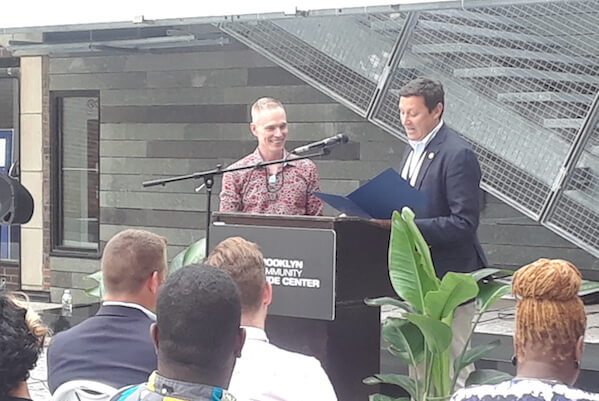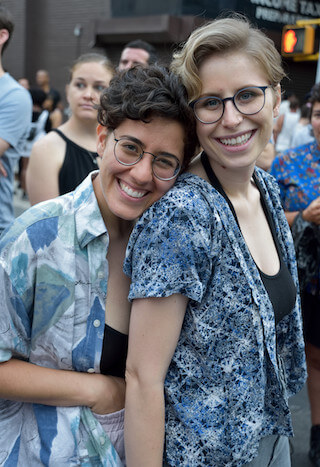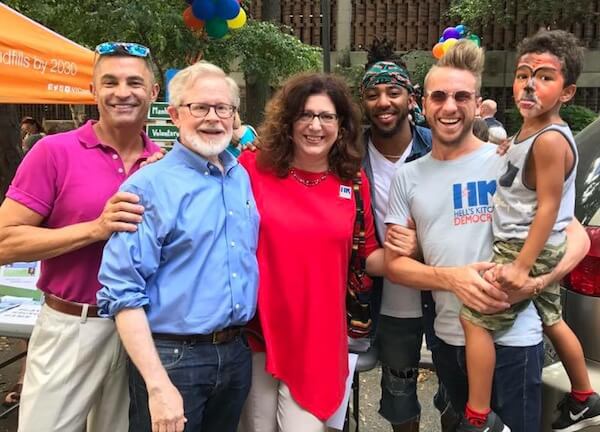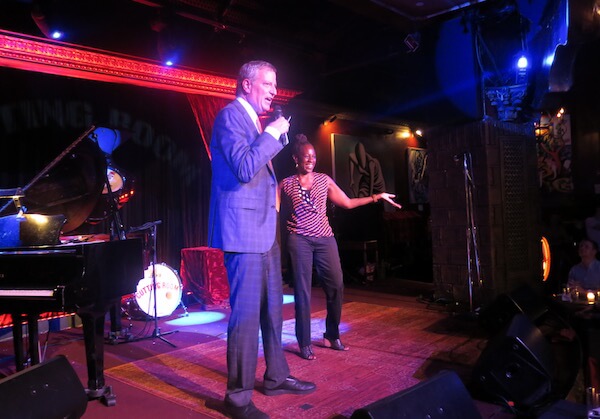Floyd Rumohr, the executive director of the Brooklyn Pride Community Center, holds the scissors at the ribbon cutting on October 11. | NATHAN DICAMILLO
The Brooklyn Pride Community Center on Wednesday celebrated the opening of its new home that gives it twice the space of its old provisional headquarters downtown.
“We’re here, we’re queer, and we’re just getting started in Brooklyn,” Floyd Rumohr, executive director of the Center, said in his opening remarks.
Rumohr, government representatives, partner organizations, and Brooklynites of varied backgrounds held a ribbon cutting at the Center’s new location at 1360 Fulton Street, on the ground floor of Restoration Plaza at New York Avenue.
Bedford-Stuyvesant site doubles facility’s space, with staff growth on deck
“Restoration Plaza is a fitting home for us given its remarkable history in revitalizing Bedford-Stuyvesant and our vision to establish a network of programs and services throughout the borough,” Rumohr said. The plaza was envisioned half a century ago to carry out a national model for community development, and has been the impetus for economic, cultural, and educational improvements in Central Brooklyn, according to the plaza’s website.
At its original MetroTech site in downtown Brooklyn, the Community Center received roughly 7,000 visitors per year. With the new location, Rumohr expects that number to double before any additional satellite offices are opened. Since the Center opened on August 18, it has already seen more average daily foot traffic than the MetroTech location.
The new Center is 3,136 square feet — twice the size of the MetroTech facility. By 2020, with other satellites throughout the borough, the total space will double again. The largest and next satellite to be built will be at the armory at Bedford Avenue and Union Street in Crown Heights.
The Center began to build out its new space when it had only a third of the budget in hand. The project cost $550,000, and with the help of a grant from Citi Community Development, the Center was able to complete a handicap accessibility ramp that brought the total budget to $600,000. Other corporate donors included Lowe’s, which contributed paint to refurbish the space.
Currently, Rumohr is the Center’s only full-time employee, but in January two more full-time staff members will come on board — a program director and a development director. The core of the program director’s role will be a youth internship program that will create 20 to 40 slots for 18- to 24-year-olds to participate in eight-week internships, Rumohr said.
David Turley, from Governor Andrew Cuomo's office (right), with Floyd Rumohr. | NATHAN DICAMILLO
For Rumohr, Wednesday was a new beginning for the Center as it embarks on collaborations with four community partners: Callen-Lorde Community Health Center, an LGBTQ primary care provider; CAMBA Young Men’s Health Project, which has an HIV program for 13- to 24-year-olds; Services and Advocacy for GLBT Elders (SAGE), which has five other senior service centers citywide; and the Stonewall Community Development Corporation, which does elder research and advocacy.
These organizations are in-house licensees of the Center, giving them 24/7 access to the facilities there. With Brooklyn rent rising, space is at a premium for community-based organizations and the Center wants to provide quality facilities for these and organizations serving the LGBTQ community.
The Center also has ad hoc partnerships for temporary projects with organizations such as UpFront, a group that works with aged-out foster kids. MetroPlus, the health plan offered by NYC Health + Hospitals, is holding a series of workshops on access to healthcare at the Center, which also provides space for Alcoholics Anonymous meetings and other recovery programs.
These organizations share the Center’s “big, bold vision to establish … programs and services to serve the whole borough,” Rumohr said.
Rumohr’s aim isn’t to reinvent the wheel with the Center, but rather to build on its reach by advancing a model of community partnership.
“Collaboration comes naturally to me,” he said. “It’s a wonderful thing when it works.”
SAGE’s chief program officer, Dio Gica, sees the partnership with the Brooklyn Pride Community Center as yet another way for elderly LGBTQ New Yorkers to find resources.
“We always look for strategic partners,” Gica said.
According to Rumohr, the Center’s clientele is roughly 80 percent people of color, with a comparable percentage coming from low-income backgrounds. He said the top priorities are serving transgender and gender non-conforming people and LGBTQ people of color and creating a video oral history where LGBTQ new Americans can tell their immigration stories.
“Our community deserves a diverse, thriving community hub,” Rumohr said.
Gay and HIV-positive, Rumohr came on board with the Community Center in late 2015. Prior to that, he had been interim executive director of Love Heals, a provider of HIV/ AIDS education in New York City public schools, and a non-profit consultant. In 1994, he founded Stages of Learning, a nonprofit arts education organization to bring literacy-rich drama programs into public schools.
The Brooklyn Pride Community Center is a logical next step in the organizational building Rumohr has accomplished in his career.
“I want to do this,” he said. “When I was poor, when I was suicidal, people lifted me up.”
Gabriel Lewenstein, the LGBTQ outreach coordinator for Public Advocate Letitia James, praised the Center staff and board members and Brooklyn residents and volunteers who made the new facility possible.
“Tish often talked about it over the decades,” Lewenstein said. “That she worked here as a Brooklyn girl, she had seen the structure of LGBTQ organizations. There have been a lot that have gone up and a lot that have closed, and she is so excited to have another center open here today.”
Governor Andrew Cuomo’s director of constituency affairs, David Turley, read a letter from the governor at the ribbon cutting. Cuomo praised the Center as one of the most important resources for LGBTQ people and an effective network of advocacy and outreach.
“Here in New York State we are a proud champion of social and civil rights,” the governor wrote. “We are committed to ensuring equality and justice for all people. We will always provide a safe and welcoming place for the LGBTQ community and reaffirm our effort to further progressive values on which our state is built.”






































